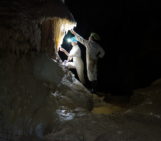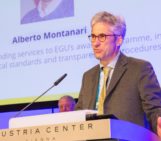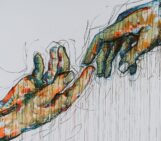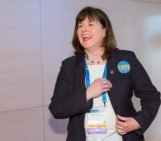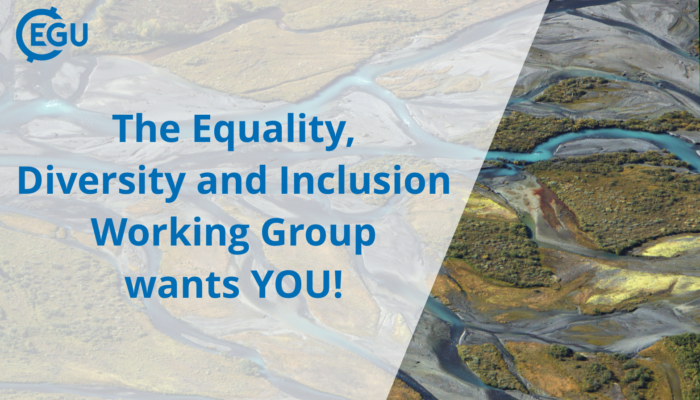
In autumn 2018, the EGU Council established a working group whose aim is to promote and support equality, diversity, and inclusion in the Earth, planetary, and space sciences, with a focus on EGU activities. The group works closely with EGU’s Council and Committees to improve EGU’s equality, diversity and inclusion as an organisation. Since the Equality, Diversity and Inclusion (EDI) Working Group began, we have worked to make changes within EGU, such as organising unconscious bias training, improving both online and on-site accessibility, co-ordinating sessions and initiating conversations at each EGU General Assembly around EDI issues. We also work with our members to implement initiatives proposed by them such as the new EDI logo that recognises and highlights the diversity of session convener teams. We also work on more light-hearted, but still important activities that raise the visibility of our diverse EGU membership for people of all ages, like the EGU colouring book!
With these activities, the Working Group are trying to make EGU a more inclusive environment that welcomes each individual and their needs, without any bias related to race, religion, or cultural identity, gender identity or expression, sexual orientation, national or regional origin, disability, age or any other aspect of their identity. As a scientific union that operates at the European level, EGU has the unique opportunity to set an example and lead the way for change, so that others may follow. We believe that, in order to achieve this, our EDI Working Group needs to continue to evolve and grow – but not just in numbers. The only way to reach true equity and inclusion is when every voice is heard, and we recognize that as an EDI working group, WE are presently not yet representative of the diversity of EGU’s membership. We believe that what makes us different; who we are, what we’ve experienced, how we think, is essential for making us as a Union stronger. We would like to increase the strength and effectiveness of our EDI team and to do so, we are looking for new voices!
To help us, we want to give you the opportunity to tell us which voices you think are not being heard yet. Who do you think should join our EDI group? We know that self-nominating can sometimes be difficult – and that years of working inside certain structures might make you feel like you don’t belong in certain spaces (but you do), so this nomination form can work both ways. If you want to nominate yourself, you can, alternatively you can nominate someone else who you think will represent an important identity or experience currently absent in the EDI working group. We have lots of ways to participate in the EDI Working Group and welcome all personalities too, you don’t have to be loud and extroverted to make a difference. To submit your nomination, please fill out this quick form providing a brief explanation of why you or the person being nominated brings a valuable and under-represented perspective to the EDI working group.
We are particularly looking to increase representation in the EDI Working Group. In order to diversify our group we want to encourage nominations from/of people who are:
- Non-white
- Disabled and/or living with a chronic illness
- Neuro-diverse
- Living with mental illness
- Eastern European
- From the Global South
- LGBTQIA+
- Outside the gender binary
- Carers (of young children or others)
We also welcome anyone who has experience with issues including (but not limited to) the following points, though experience in addressing these issues is NOT a requirement for nomination:
- Challenging racial and/or ethnic discrimination (at any scale)
- Creating inclusive structures for disabled people and/or people living with a chronic illness, or anyone who faces any other barrier to accessibility
- Increasing participation for people who live in certain regions, particularly Eastern Europe and the Global South
- Addressing work/life balance challenges, particularly for first-generation researchers and people with caring responsibilities
So please apply! Nominations will be accepted until Friday 30 July 2021.
From this pool of nominees, we will select and invite new members to join the EDI working group. It is important that all nominees are aware that they are being nominated. Due to limited resources we may not be able to reply to everyone who nominates, but we will share the information of the successful nominees on our EDI website, if they agree.
As EGU is a volunteer organisation, all of our positions (beyond a few support staff) are volunteers – even our President is a volunteer! This means that we cannot pay anyone to participate in the Working Group, although we know that this can be a barrier to participation for some people. If this is you, or maybe you are someone who would love to add your voice to our EDI Working Group, but you cannot for some reason, we still want to hear your suggestions. Your voice and opinions are important, so you can also use our anonymous Suggestion Box to tell us “what you think the EDI Working Group should prioritise next to work on in terms of improving equity for all EGU members?”
NOMINATE new members of the EGU EDI Working Group by Friday 30 July 2021
SUBMIT your suggestions for what the EDI Working Group should prioritise next

